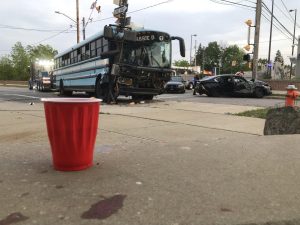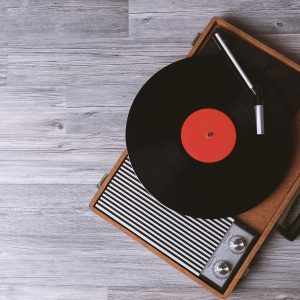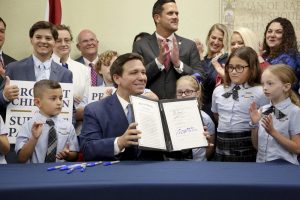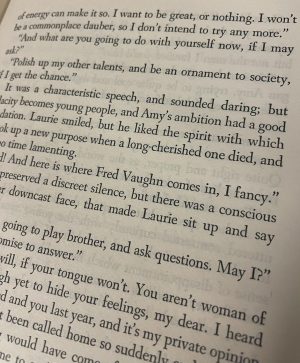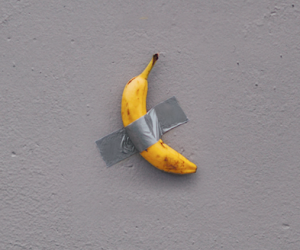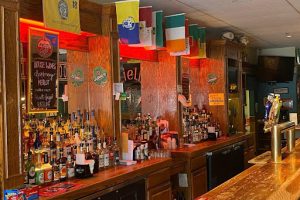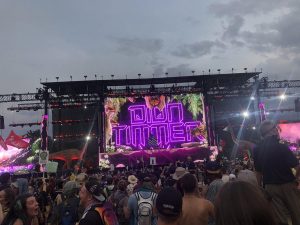“One of the best political journalism programs in the nation”: How do you “Meet the Press” at JCU?
Managing Editor Laken Kincaid sets out to learn how to become the “Meet the Press” fellow
Mar 30, 2023
Many use the weekend to unwind after being enthralled in the nine-to-five lifestyle. However, on Capitol Hill, you can be sure that, as Tim Russert would say: “if it’s Sunday, it’s ‘Meet the Press.’” For one JCU student each year, the end of the work week becomes their time to shine.
The “Meet the Press” fellowship is unique to JCU and has such a stellar reputation that it is now, perhaps, the most coveted achievement offered at John Carroll. It is a nine-month program at NBC studios in Washington, D.C. which was created to honor the legacy of Tim Russert, a 1972 JCU alum and longest host in the program’s history, following his death in 2008. The Fellowship program was conceived in 2009 and has only grown in stature since.
What makes the fellowship so special is that it affords both an employment opportunity with NBC as well as a hands-on chance to workshop one’s reporting ability. John Carroll is distinct because it is the only university that guarantees that one graduating senior will be a fellow at “Meet The Press” each academic year.
Thus far, 14 different fellows have been given the opportunity to work in Washington D.C. alongside political giants and policy protégés. Undoubtedly, the fellowship is revered as a springboard for employment in the journalism industry; for many, it created a pathway to other work at renowned companies including Fox News, U.S. News & World Report and more. Others even used the internship as a way to secure their future at “Meet the Press” far beyond their original tenure.
Nevertheless, one question still remains: how did each of these students win the opportunity of a lifetime?
The Application
According to the official webpage for the program, to qualify to apply for the “Meet the Press” internship at JCU, one must be a graduating senior with preference being given to those with above a 3.5 grade point average. While the program was once offered exclusively to those who majored in communications or political science, the fellowship is now open to all.
2023 “Meet the Press” fellow, Aiden Keenan, says that the application was “not the most burdensome one in the world” as it consists of items like a resume, cover letter and essay.
“For the last few years, the essay has been about what the role of media should be in today’s society,” Keenan elaborated. “It could change, it could change every year, but I haven’t seen it change. That’s what I wrote my essay on. Worst case, you get some practice writing a cover letter. Medium case, you get a trip to D.C., you tour the facility and you watch the show. Best case, you get an incredible role for nine months.”
It’s important to keep that in mind when applying that no one is guaranteed to win. You should never put all your eggs in the ‘Meet the Press’ basket. Even some very gifted people have lost.
— Carrie Buchanan
The JCU Interview
Following some early vetting, a handful of hopefuls will be asked to attend an initial interview for the program on Carroll’s campus. These select applicants will sit before a panel consisting of professors in both the communications and political science departments as well as a few members of the administration.
This evaluation, as informed by past candidates of the “Meet the Press” fellowship, has two segments: a test of skill as well as the standard question and answer dialogue observed with most job hirings. The former section requires applicants to research a specific political figure or event, create a summary for said figure or event and then create a set of questions they would ask their sources with added thought for predictions as to what they believed their interviewees would respond with. Keenan says that this portion of the interview felt “very much like an extemporaneous speech,” a speech event he both competed in and received national recognition for during his tenure at JCU.
“The speech and debate skills really were crucial,” Keenan said. “They were something I didn’t appreciate enough coming into this (process).”
After this, each member of the panel typically has one to two queries for the student. These questions range from personal questions like what draws the contender to the program to production-based inquiries on either writing or broadcast or even hard-hitting, typically locally-based political questions which demonstrate whether the candidate is up to date with the inner workings of the government.
What Makes a Good Candidate?
“We look for political junkies,” Colin Swearingen, a political science professor and recurring member of the “Meet the Press” interview panel, told The Carroll News. “If Chuck Todd asks about the Governor of Ohio and cracks a joke you should know what he means. You should know how to pronounce Kyrsten Sinema’s name.”
Olivia Shackleton, the 2020 “Meet the Press” fellow and an associate producer with Fox News Media, adds that “what makes a good candidate is a person who has a strong interest in politics and in news. You have to be aware of what is going on nationally and internationally and be willing to pitch story ideas/angles and explain their significance to the staff.”
Outside of political knowledge, there are other qualities which make a prospective candidate stand out. Swearingen says that the panel will often look for those with writing experience at either The Carroll News or outlets in the community along with a drive to succeed.
“I think one of the most important qualities in a Russert Fellow candidate is a strong work ethic,” Ashley Bastock, the 2015 fellow and current Cleveland Browns beat reporter for cleveland.com, elaborated. “The ability to perform simple tasks and try and become a go-to person when you are given a task is really important, whether it’s organizing show materials or answering phone calls and emails, or research. Never think any task is beneath you.”
Carrie Buchanan, a retired professor in the communications department and past member of the JCU interview panel, says that she often looked for those with reporting skills and at least one journalism course “under [their] belt[s].”
“You have to be a really good student; you’ve got to have a good average,” Buchanan continued. “I do highly recommend that people have at least some political science or journalism or communication in their background but you certainly don’t have to be a major.”
Kristen Jantonio, the 2011 “Meet the Press” fellow, says that her internships at stations like WKYC and WEWS were very beneficial. In addition, she also says that her experience with extra curricular activities like The Carroll News and her debate class with Brent Brossmann helped her prepare greatly.
Keenan says that courses like Swearingen’s U.S. Congress course and Brossmann’s Introduction to Advocacy helped ready him for the opportunity. Buchanan also recommends Swearingen’s U.S. Politics course as well as activities like student government and broadcast-based organizations like JCTV and WJCU 88.7 to give undergraduates the real world experience they need.
Nora McKee, the 2023 “Meet the Press” fellow, reiterated that political and broadcast knowledge was crucial to moving past the first stage. However, it also boils down to the charisma you present to the panel that convinces them to move your application forward.
“I think there is a need to know what you are talking about in both the political realm and production realm,” McKee stated. “Both of these topics come up in both interviews (as it is the nature of the position) and having clear knowledge about these two worlds really allowed me to be myself and portray myself authentically. Show them your personality. If you are passionate and driven, it will shine through.”
The NBC Interview
After the initial interviews of the candidates conclude, the panelists make the decision to send up to four students to the official NBC News studio in Washington D.C. to be further evaluated by the staff of the show. Yet, no matter your background or your preparation, you can never guarantee a spot at NBC. Swearingen says that, in the end, “it all comes down to fit. What do they need at the moment?”
“It’s important to keep that in mind when applying that no one is guaranteed to win,” Buchanan stated. “You should never put all your eggs in the ‘Meet the Press’ basket. Even some very gifted people have lost.”
From the viewpoint of the producers, Chuck Todd told students at John Carroll during his visit to campus this past fall that, while he does not typically interview candidates now, he still looks for those who are not only a “political junkie” like Swearingen suggests, but also those who are able to adapt to the changing sphere of media.
“I always say that when somebody tells me that they want to be a journalist, I always say ‘then you’re doing it wrong’ because there’s no such thing as majoring in a platform,” Todd said. “You should be platform agnostic on how you learn. One of the things that I think we’ve done now is create a platform agnostic environment.”
Todd also said that he likes to look for fellows that are geographically diverse from his current staff and those that are willing to write.
The Future of the Fellowship
After the finalists conclude their final evaluations on the hill, decisions on employment are traditionally released one to eight weeks after the D.C. visit. On the other hand, the timeline for the program has shifted in recent years meaning that this could impact the coming application cycles.
In spite of this potential variation, one thing is for certain: the fellowship is not going to disappear anytime soon. In a past article in The Carroll News, Peggy Finucane, the chair of the communications department at JCU, said that she does not see the program struggling. With the further introduction of a journalist-in-residence and the release of the “Tim Russert: the John Carroll years” documentary potentially spiking interest in the field on campus, the fellowship could see more applications in the future.
“I hope we have an extraordinarily difficult time finding our next ‘Meet the Press’ fellow, because if there are so many people applying, the President may ask me if I could take two or three slots,” Todd said.
For those interested in the fellowship, the application timeline and supplementary information is available here.





